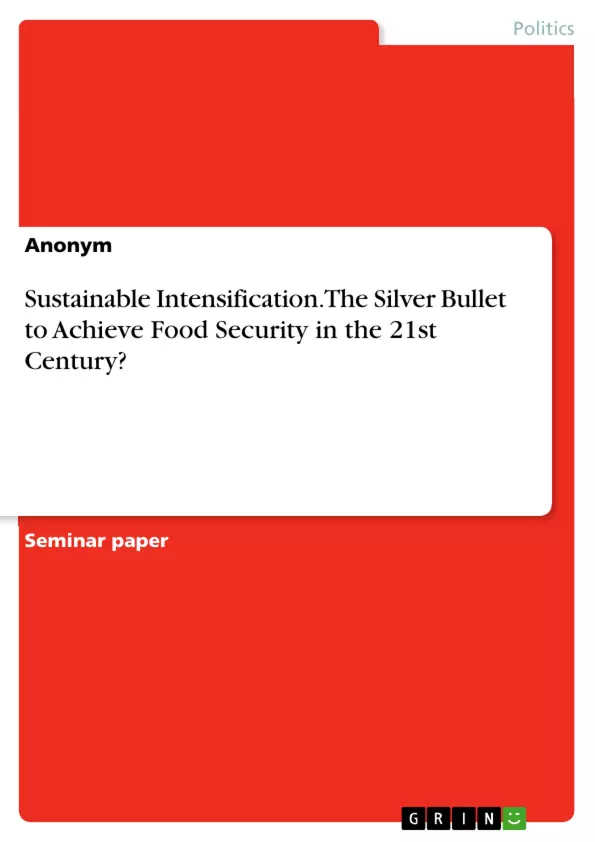In the last years, global concerns about the issue of how the world can provide a growing population with sufficient food have attracted increasing attention. Studies suggest that with world population growing up to around 9 billion until 2050, global food production needs to increase by 60 percent to 110 percent. Trends like globalization and urbanization as well as shifting diets will not only influence what kind of food is needed but also how it is produced and distributed.
The food price volatilities in 2007/2008 and again in 2011 revealed the vulnerability of millions of people to hunger. Also, agriculture is a major driver and victim of climate change.
This nexus of concerns – price volatility, environmental damage, population and consumption growth – poses a major challenge to policymakers with regard to food security. There seems to be a common understanding that the way in which food is produced needs to change. The key question for the international community is: How can food security be attained in the future, while at the same time minimizing environmental impacts?
Some claim that the concept of sustainable intensification, which has gained popularity in political and scientific circles in recent years, provides an adequate answer to this question. Support for the concept comes from high-profile papers as well as from policy documents. There are different takes on what sustainable intensification actually means but most approaches agree on the the following premises: food production has to increase; the vast majority of this increase has to come from existing agricultural land; increasing the sustainability of food production is of major importance, a broad range of tools and production methods must be considered to attain these goals.
Inhaltsverzeichnis (Table of Contents)
- Introduction
- Food Security in the Light of Climate Change
- The Paradigm of Food Security
- Food Security and Human Development
- Pressures on Global Food Security in the 21st Century
- Sustainable Intensification
- The Four Premises of Sustainable Intensification
- A Silver Bullet for Food Security?
- Conclusion
Zielsetzung und Themenschwerpunkte (Objectives and Key Themes)
This paper examines the concept of sustainable intensification and its potential to address the challenge of achieving food security in the context of climate change. It aims to unpack the debate surrounding this concept and analyze its adequacy as a solution to the complex problem of global food security.
- The evolving paradigm of food security and its relationship to human development
- The pressures on global food security in the 21st century, including climate change, population growth, and consumption patterns
- The concept of sustainable intensification and its four fundamental premises
- The controversies surrounding sustainable intensification and its potential limitations
- The viability of sustainable intensification as a solution for achieving food security.
Zusammenfassung der Kapitel (Chapter Summaries)
The first chapter provides an overview of the increasing global concerns surrounding food security and the growing need to increase food production in the face of a rising population. The chapter also explores the impact of globalization, urbanization, and shifting diets on global food systems.
The second chapter focuses on the concept of food security, tracing its historical evolution and highlighting the four key dimensions of food security: availability, access, utilization, and stability. This section examines the complex relationship between food security and human development, emphasizing the interconnectedness of these two critical factors.
The third chapter introduces the concept of sustainable intensification as a potential solution to the challenges of food security. It examines the four key premises of sustainable intensification, including increasing food production, utilizing existing agricultural land, enhancing the sustainability of food production, and employing a diverse range of tools and methods.
Schlüsselwörter (Keywords)
This paper explores the key concepts of food security, sustainable intensification, climate change, human development, agriculture, and food production. It examines the debates surrounding the concept of sustainable intensification as a potential solution to the challenge of achieving global food security.
Frequently Asked Questions
What is the concept of sustainable intensification in agriculture?
Sustainable intensification is an approach aimed at increasing food production from existing agricultural land while simultaneously reducing environmental impacts.
Why is global food production expected to increase by 2050?
Studies suggest that with a growing population of 9 billion people, global food production needs to increase by 60% to 110% to ensure food security.
What are the four key dimensions of food security?
The four dimensions are availability, access, utilization, and stability of food supplies.
How does climate change affect global food security?
Agriculture is both a driver and a victim of climate change; environmental changes threaten crop yields and contribute to food price volatility.
What are the fundamental premises of sustainable intensification?
The premises include increasing production, using existing land, enhancing sustainability, and considering a broad range of production tools and methods.
Is sustainable intensification considered a 'silver bullet' for hunger?
While popular in policy circles, the concept is controversial, and its adequacy as a complete solution to global food security is still being debated.
- Citation du texte
- Anonym (Auteur), 2017, Sustainable Intensification. The Silver Bullet to Achieve Food Security in the 21st Century?, Munich, GRIN Verlag, https://www.grin.com/document/428809



